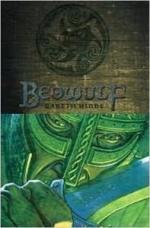The next morning, at early dawn, warriors in numbers flock to the hall Heorot, to hear the news. Joy is boundless. Glee runs high. Hrothgar and his retainers are lavish of gratitude and of gifts.
Grendel’s mother, however, comes the next night to avenge his death. She is furious and raging. While Beowulf is sleeping in a room somewhat apart [x] from the quarters of the other warriors, she seizes one of Hrothgar’s favorite counsellors, and carries him off and devours him. Beowulf is called. Determined to leave Heorot entirely purified, he arms himself, and goes down to look for the female monster. After traveling through the waters many hours, he meets her near the sea-bottom. She drags him to her den. There he sees Grendel lying dead. After a desperate and almost fatal struggle with the woman, he slays her, and swims upward in triumph, taking with him Grendel’s head.
Joy is renewed at Heorot. Congratulations crowd upon the victor. Hrothgar literally pours treasures into the lap of Beowulf; and it is agreed among the vassals of the king that Beowulf will be their next liegelord.
Beowulf leaves Dane-land. Hrothgar weeps and laments at his departure.
When the hero arrives in his own land, Higelac treats him as a distinguished guest. He is the hero of the hour.
Beowulf subsequently becomes king of his own people, the Geats. After he has been ruling for fifty years, his own neighborhood is wofully harried by a fire-spewing dragon. Beowulf determines to kill him. In the ensuing struggle both Beowulf and the dragon are slain. The grief of the Geats is inexpressible. They determine, however, to leave nothing undone to honor the memory of their lord. A great funeral-pyre is built, and his body is burnt. Then a memorial-barrow is made, visible from a great distance, that sailors afar may be constantly reminded of the prowess of the national hero of Geatland.
The poem closes with a glowing tribute to his bravery, his gentleness, his goodness of heart, and his generosity.
* * * * *
It is the devout desire of this translator to hasten the day when the story of Beowulf shall be as familiar to English-speaking peoples as that of the Iliad. Beowulf is our first great epic. It is an epitomized history of the life of the Teutonic races. It brings vividly before us our forefathers of pre-Alfredian eras, in their love of war, of sea, and of adventure.
My special thanks are due to Professors Francis A. March and James A. Harrison, for advice, sympathy, and assistance.
J.L. HALL.
[xi]
ABBREVIATIONS USED IN THE NOTES.
B. = Bugge. C. = Cosijn. Gr. = Grein. Grdvtg. = Grundtvig. H. = Heyne. H. and S. = Harrison and Sharp. H.-So. = Heyne-Socin. K.= Kemble. Kl. = Kluge. M.= Muellenhoff. R. = Rieger. S. = Sievers. Sw. = Sweet. t.B. = ten Brink. Th. = Thorpe. W. = Wuelcker.




